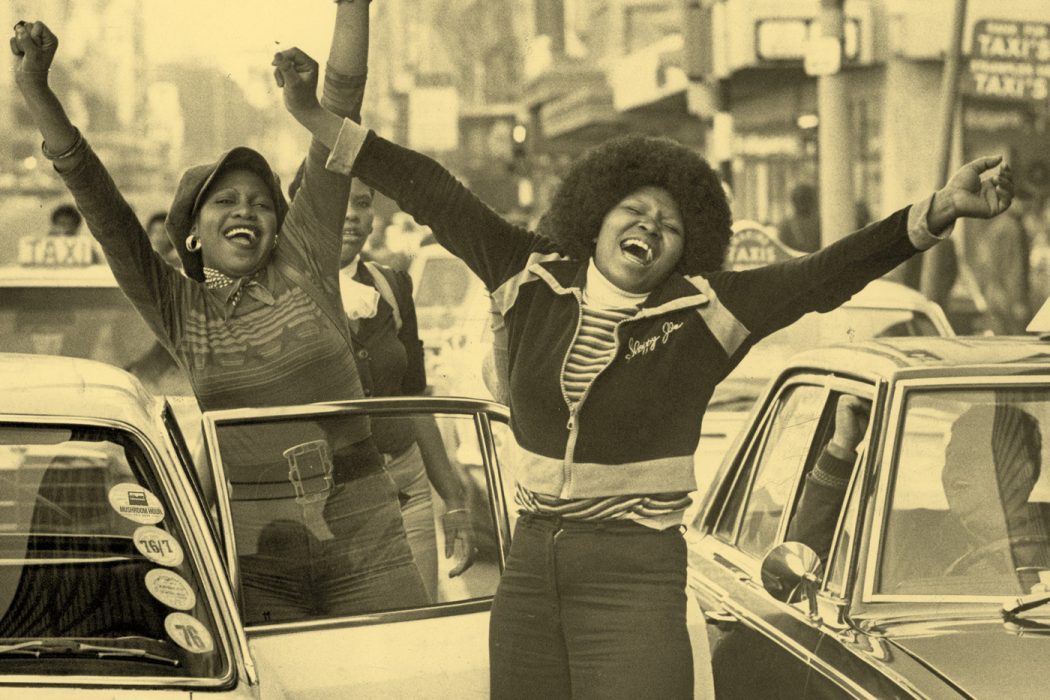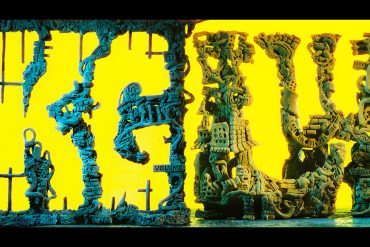Impassioned fury and gorgeous improvisations coalesce on SPAZA’s UPRIZE!, a soundtrack whose themes explore a tumultuous history, acting as a powerful reflection of today.
Stream: ‘UPRIZE!’ – SPAZA
The brutality of the South African apartheid echoes through history, but its chimes weren’t heard until well after. Soweto students organized and conducted protests in opposition to sanctioned racial segregation and discrimination in 1976, acting as the catalyst for what would soon become violent clashes with authority, death being the result. It’s these events that are explored in Johannesburg-based collective SPAZA’s album UPRIZE!. The album accompanied the 2017 documentary of the same name, creating a space of raw intensity that not only acts as the soundtrack to historic moments but also as the reminder of the crises in this era.

This rotating collective from the Mushroom Hour Half Hour label features the talents of Ariel Zamonsky, Gontse Makhene (percussion), Malcolm Jiyane (piano/trombone/vocals), and Nonku Phiri (vocals), each providing a fervent touch that ultimately creates a listening experience that is both stirring and hope-laced. The emotions that lie within each track and note hit are palpable, surrounding listeners with its enrapturing soundscapes. It’s a visceral listen through and through, one that haunts as well as it enchants.
“Bantu Education” is an eerie beginning. The melody undulates with a spine-shivering effect, an apt direction for the oppressive law in which the song is named after. This law stripped children of their history, snippets of audio from the documentary played throughout the song providing further context. The deep horn bellows out with original vocals in the foreground that act almost as a precursor for what’s to come.
From haunting to alluring, Phiri takes a rightful spotlight as her vocals fill the air with an unmatched grace on “Sizwile.” The track is a dream; its rhythm and melody an unfettered exploration that serves as a defining moment for the album. The horns that enter around the six-minute mark are soft in their presence, but not understated. Each note hit further hypnotizes, allowing for a sound that listeners would be hard-pressed not to find themselves intoxicated by. The light that “Sizwile” brings, however, cannot exists without the accompanying darkness.

Tracks like “Mangaliso Sobukwe” and “The Black Consciousness Movement” bring the horrors of apartheid into an auditory form – their sounds wrapped in foreboding stanzas that bring with it apprehension and fear. Phiri herself takes electronic assistance that allows for her vocal cadences to float like a specter; equal parts grim and captivating. On these methods, Phiri shared with Atwood Magazine that “I think the relationship between improvisation and composition is very vital to my personal creative journey because it allows for me to constantly find ways to revisit my approach and adapt to any setting. SPAZA is a very good example of that.”
She provided further insight, detailing that “I was able to come in with my gadgets and find ways to work with the challenges of not necessarily having a set BPM, or not necessarily having the variables that I would need to kind of contribute, and what I imagined I needed to contribute. An experience like SPAZA, and its manner of exploring my gadgets from an improvisational perspective, has played a huge role in my growth as an electronic artist, or as somebody who basically uses gear to convey vocally.”
Compared to “Sizwile,” “Solomon Tsietsi Khotso” entertains a more sparse approach, and it executes it with absolute refinement. The backing piano that joins is a delicate yet fierce addition that plays well with the percussion. The piece uses stillness as its weapon, and it brandishes it well, creating a vivid exploration that needn’t dive into outpours to carry out its message. “Banna Ba Batsumi,” however, begins with grit and with it an unrelenting grip.
The double-bass that begins is energetic, leading the way for the percussion and piano to add a memorable melody. The vocals then drive the piece’s excellence to new heights, adding a celestial quality that culminates in an onrush of instrumentation – swirling the ears and enthralling the senses with its delightful touch. “Bayasiphazamisa” utilizes its energy in a different fashion, almost wild in its appearance but nonetheless enamoring all the same.

Additional vocals from the documentary are folded in, and when joined by the rest of SPAZA, it’s evident listeners are nearing the climax. Towards the end of the track, howls and shrieks surround the percussion, acting as the final exclamation point to a moment of intensity. “Xolile Mosi” opts for a smoother touch, the piano-driven rhythm a reprieve from the turbulence of songs past. At first, at least. Phiri haunts with her incantations as the song nears its end, hovering above the piano as it begins to dial its momentum up.
As the audio from “We Got a Lot of Work to Do” alludes to, this is not the end. The journey for a more just world is ongoing, and it’s one that can’t be slowed down on. It’s sentiments like this that carry over into the crises of today, where racial equity is being attacked. This is an ongoing struggle, and the album’s finale is a portent reminder that our ties to the past are still unfortunately strong.
It’s no light listen, but the power that SPAZA’s UPRIZE! carries is one that cannot be missed, and by doing so, one would only be doing themselves a disservice. The upheaval that is alive at this moment in time was anticipated in the mood and tone of the album, offering an emotional outpour that brings to life the outrage that resides within many. Alongside this outrage is hope, however, and it’s this hope that carries the final message of a better, more just world for all.
— —
:: stream/purchase UPRIZE! here ::
— — — —

Connect to Mushroom Hour Half Hour on
Facebook, Twitter, Instagram
Discover new music on Atwood Magazine
? © African News Agency
UPRIZE!
an album by SPAZA








